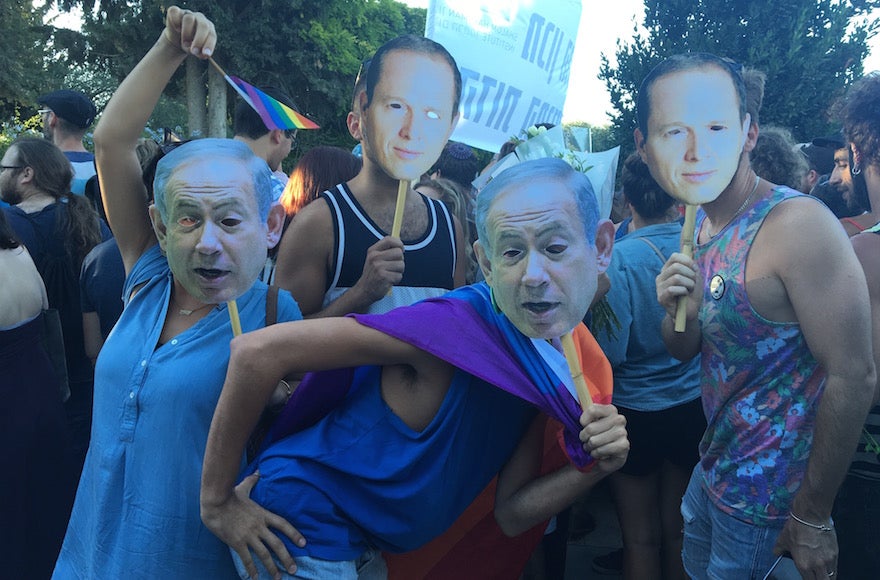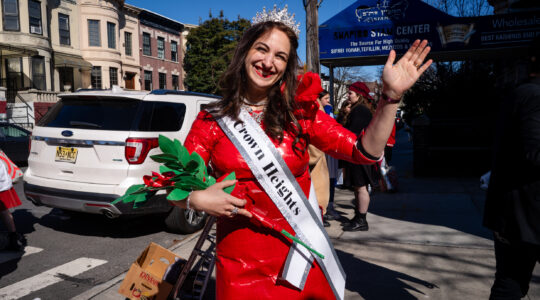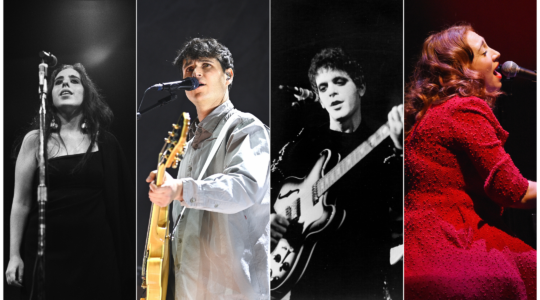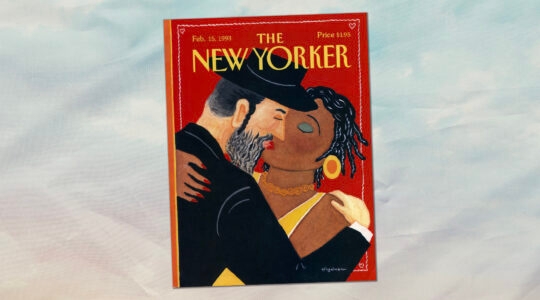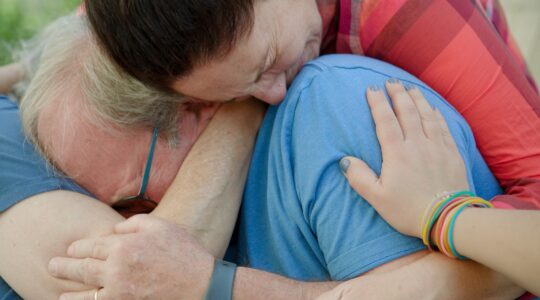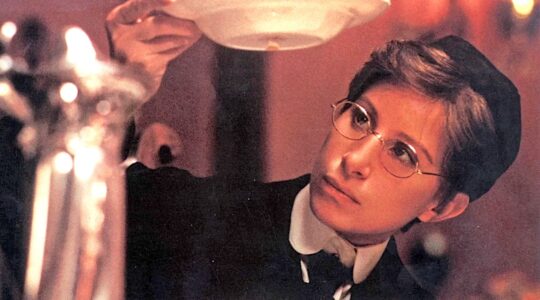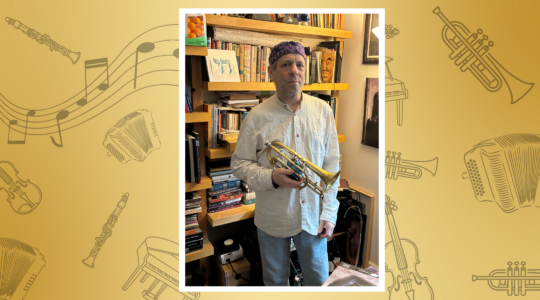It had been a rough week or so for Israel’s LGBT community.
The mayor of Jerusalem opted not to attend the capital’s pride march so as not to offend haredi Orthodox and religious Zionist residents.
His decision came on the heels of 300 leading religious Zionist rabbis backing a prominent colleague, Rabbi Yigal Levinstein, who called LGBT people “deviant.”
Beersheba police banned a planned pride march from the southern city’s main street over security concerns, after the city’s chief rabbi criticized the event.
And the jailed haredi Orthodox man who murdered 16-year-old Shira Banki during a stabbing rampage at last year’s pride march in Jerusalem and his brother were charged with planning another attack this year.
Still, the vibe at the Jerusalem Pride March Thursday, attended by an estimated record-breaking 25,000 people, was cautiously optimistic. There was widespread agreement among participants that, despite setbacks, Israel is getting more LGBT-friendly.
Yuval Regev, a 22-year-old who works in digital media in Tel Aviv, posed for photographs with friends in a homemade mask of Prime Minister Benjamin Netanyahu’s face.
“We want Bibi to be here with us, and he’s not. So we brought him over,” he explained, as he waited to be screened by police before the march.
“But from right to left on the political spectrum, it’s positive that we’re hearing support,” he said. “It’s better to be gay in Israel in 2016 than it was in 2006. And it’s still getting better. It would just be false to say that because we’re going down the nationalistic path, we’re going down the homophobic path.”
Regev cited the election of Amir Ohana, the first openly gay Knesset member from the right-wing Likud party, as evidence of the emerging pro-LGBT consensus in Israeli politics.

Emanuel Miller at the Jerusalem Pride Parade, July 21, 2016. (Andrew Tobin)
Netanyahu was among the ministers who condemned the anti-LGBT remarks by Rabbi Levinstein. The prime minister posted a Hebrew-language video to Facebook Thursday calling the Jerusalem event a “march of unity” for all those who believe in equality. After facing criticism, Barkat on Wednesday defended his decision to skip the march, telling Channel 2: “I am a partner to the aim of achieving more tolerance, but not every means brings you to that target.”
Like Regev, Tom Canning, the associate director of the Jerusalem Open House — the LGBT group behind the Jerusalem Pride March — saw marked progress in Israel, along with room for improvement.
“I’m happy that at least at the highest levels of government, they’re not letting what’s happening go quietly, and Nir Barkat has been widely condemned. He’s one of the fewer leaders in Israel who doesn’t support Jerusalem Pride,” he said.
“It’s clear that most of the homophobia is within Orthodox communities. But ultra-Orthodox communities have never been our enemy and we will be continuing to work in our ways, quietly and behind the scenes, to create tolerance wherever homophobia remains.”
Noa Eshel, a 24-year-old student at the Hebrew University of Jerusalem, was marching with a group of dozens of LGBT activists from Beersheba. Organizers there called off the Beersheba march in favor of a protest at the city council after the High Court of Justice allowed police to reroute it. A former student in a mixed religious-secular preparatory course for the Israel Defense Forces, she said she and her friends agreed on the need for more dialogue, and less condemnation.
“I know a lot of rabbis who are going to be here,” she said.
Emanuel Miller, a 29-year-old British Orthodox Jew who works at an NGO in Jerusalem and prays three time a day, stood in the middle of the march wearing signs on his front and back.
The front sign read: “Hatred is my enemy. Religious, straight, and I love all of you.” The back sign: “Love and let love. Religious, straight, and I love all of you.”
“I think it’s essential when people are scared and feel vilified, for the people who are vilifying them to come out and show them that yes, we recognize that you’re human beings,” he said. “Religion can be used as a tool for good or bad. … There are rabbis who have come out and said wonderful things.”
While most of the march was relatively subdued, lacking the hundreds of thousands of revelers, floats and half-naked men Tel Aviv Pride is famous for, a rowdy wedding party made its way down the street, with the grooms, Jerusalemites Yochai Werman and Yotam Hacohen, dancing under a mobile huppah.
Gabi Gabai, 45, an Orthodox educator from the West Bank settlement of Kfar Adumim, stopped at a memorial to Banki along the march’s route. He was with his wife and six children.
“This is my first time [at a pride event], just because of the murder and because of all the bad voices. I wanted to tell my kids that you can think differently,” he said. “There are a lot of people here with a kippah, without a kippah. I don’t think this is a big issue now. This is a matter for all the country. It’s not just for the gay community.”
Despite the positivity among marchers, the 2,000 police deployed along the fenced-off route were a reminder that not everyone in the city felt the same way. Police arrested 48 people suspected of trying to disrupt the march.
Banki’s parents had urged the public to attend the march this year, and her father addressed marchers at the end of the route Thursday evening, saying: “The lesson we have to learn from Shira’s murder is that moderation is a virtue for all of us, and that radicalization of any kind is a sure path to destruction.”
Liron Shimonie, a 31-year-old stylist with two gay sisters, said she and many of her friends were at the march to honor Shira Banki.
“I came just because of Shira. It was very important to me. I saw it on TV. I felt the injustice, and I wanted to do something,” she said. “There’s not a lot I do. But I’m doing this.”
JTA has documented Jewish history in real-time for over a century. Keep our journalism strong by joining us in supporting independent, award-winning reporting.
